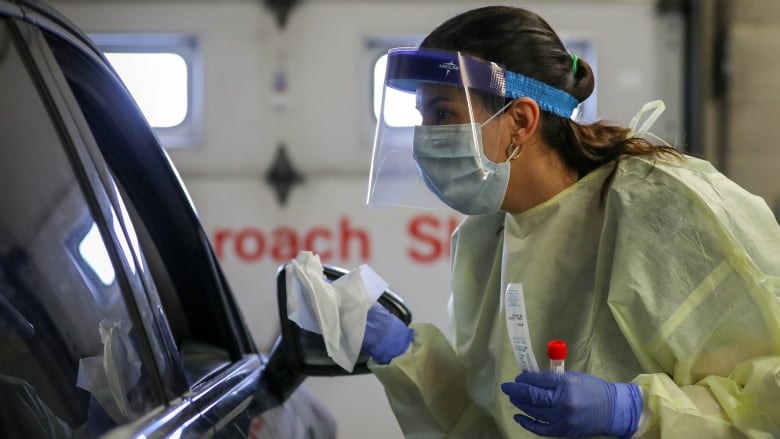Treatment options for immunocompromised Albertans explored as tough subvariant takes hold
Health Canada notes limited efficacy of at-home treatment Sotrovimab against BA.2

With the highly transmissible Omicron subvariantnow dominant in Alberta, there are questions about what COVID-19 therapywill be effective fortreating high-risk Albertans, particularly if the province is thrust into another wave.
BA.2 now accounts for 70 per cent of Alberta's lab confirmed cases.
South of the border, the U.S Food and Drug Administration pulled its authorization for the monoclonal antibody treatment Sotrovimab in states where BA.2 is dominant, after lab studies suggested it isn't effective against that variant.
"It's just something that just changes over time. Why BA.2 is resistant to Sotrovimab, it's just bad luck,I think," said Dr. Dan Gregson, an infectious disease physician and medical microbiologist at the University of Calgary.
"It's hard when we don't have a lot of clinical data on the lack of efficacy of Sotrovimab, although there are some case reports from the literature that it has not worked in some cases. So we're sort of going based on laboratory data rather than clinical data."
Sotrovimab is given as an IV infusion, most often by Alberta's community paramedics. It's available to some groups of unvaccinated Albertans and those who are immunocompromised regardless of their vaccination statusand must be given within five days of symptom onset.
According to the province, 1,538 Albertans have received Sotrovimab infusions so far, and the question of whether it will continue to be offered is under consideration.
"We are currently reviewing the evidence around Sotrovimaband will make recommendations as warranted. No decisions have been made at this time," Alberta Health spokesperson Lisa Glover said in a statement emailed to CBC News.
"While treatments are an important tool to have at our disposal, the best protection against severe outcomes continues to be through vaccination."

All this comes at a time when wastewater data is showing upticks, positivity rates are starting to rise, and there are concerns about a possible resurgence.
"The problem is going to be if we have lots more infections occurring over the next month, if we have another wave then we're looking at again the need for more people to be treated and again probably for a better monoclonal," said Gregson.
Health Canada has yet to release guidance on the future use of Sotrovimab, according to Dr. Alain Tremblay, a Calgary respirologist and member of COVID therapeutics working group, which advisespublic health officials on COVID-19 treatments.
"In Alberta, we're debating what's the significance of this change," he said.
"Right now, we do have a bit of a concern for our sick, immunocompromised patients if Sotrovimab is not effective"
Tremblay said the antiviral pill Paxlovid which has been the first-line drug for outpatients is still considered effective.
It's been prescribed to 382 Albertans,andHealth Minister Jason Copping announced Wednesday the province is receiving additional shipments.
Starting Friday,Paxlovid, which was initially offered at only 135 pharmacies due to limitedsupply,will be available to any pharmacy that wants to dispense the drug to eligible Albertans.
But, doctors warn, the antiviral isn't an option for everyone, including organ transplant patients, mostly due to the potential fordrug interactions.
"Those individuals are the ones we're trying to figure out what are our alternatives if we decide not to give them Sotrovimab?"
Part of the problem, according to Tremblay, is the latest evidence is based on lab studies, not real world data,and it isn't entirely clear if Sotrovimab has lost all or just some of its effectiveness against BA.2.
"The FDA has decided that it's probably not worthwhile. Now the one thing that's different in the U.S., and perhaps that had an impact, is they have an alternative antibody that's not yet Health Canada approved," said Tremblay.

In a statement emailed to CBC News, Health Canada said that,as with all COVID-19 therapies, it has requested the manufacturer of Sotrovimabto monitor and provide efficacy data against all variants, including Omicron.
"Health Canada is aware of the limited efficacy against the BA.2 sublineage of the Omicron variant," a spokesperson said in the email.
"While some data have already been provided, Health Canada expects to receive additional data. Once Health Canada has assessed the data provided by the manufacturer, the department will communicate the information on our web portal as well as with health-care professionals."
Meanwhile, as the latest data is reviewed, doctors are looking at ways to fill the gap that could be left behind by Sotrovimab.
Oneoption that could be considered,according to Tremblay,is to offer the anti-viral drugRemdesivir currentlyused only in the hospital setting to non-hospitalized, high-risk patients when they test positive.
But it would be logistically challenging, requiringthree days of intravenous infusions. And it's unclear if there would be enough supply.
Tremblaysaid that regardless of what happens with Sotrovimab, it's important high-risk Albertans still get tested for COVID-19 and call the dedicated Health Link line for potential treatments as quickly as possible.
And, Gregson added, it's important everyone isas up to date on their COVID-19 vaccinations as possible.
"Your main safety valve is immunization."












_(720p).jpg)


 OFFICIAL HD MUSIC VIDEO.jpg)
.jpg)



























































































